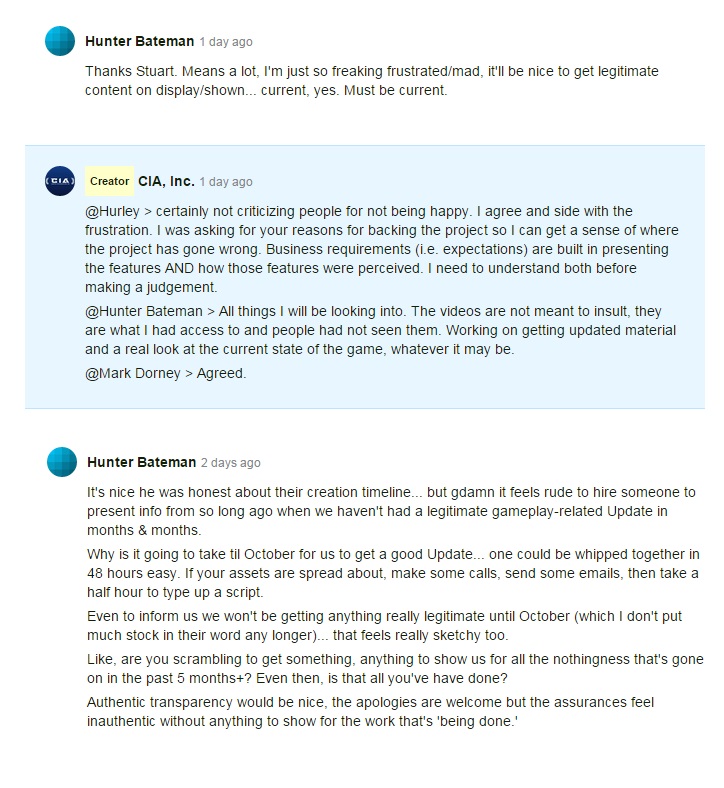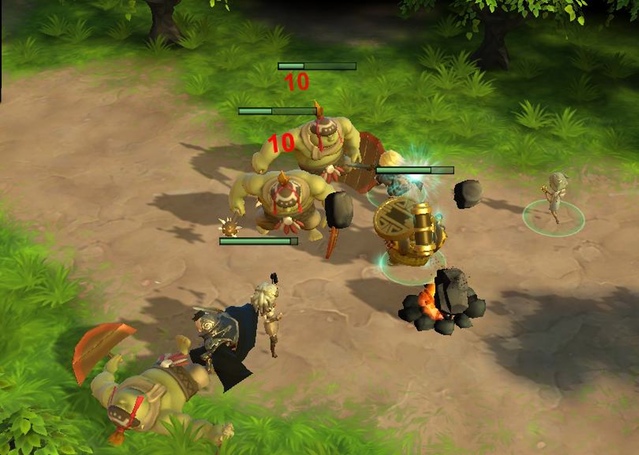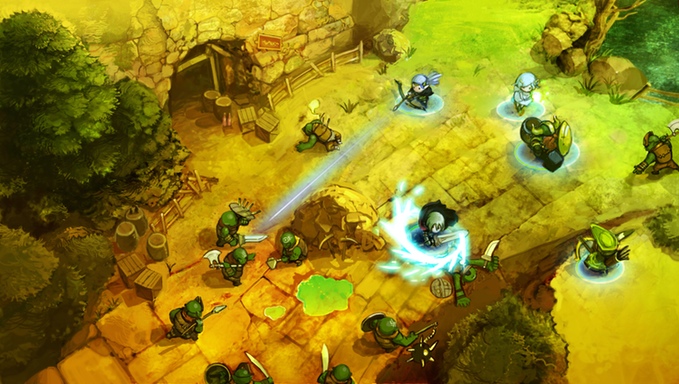In an effort to allay backer concerns CIA recently brought project consultant vet Stuart Massie on board to handle a number of responsibilities, including PR and community management. In an update from a few days ago Stuart jumped right in by introducing himself, sharing his plans, and showing off some previously unseen game footage.
Unfortunately things went south almost immediately. As you can imagine many of the backer comments relate to the gameplay footage. What Stuart showed was raw, un-produced, low res, and frankly pretty underwhelming. Compare the footage above to this screenshot from the December 12th 2014 update.
You could argue that it doesn’t look significantly different but the new footage certainly doesn’t look any better, and it’s a far cry from the gameplat concept art shown during the original campaign.
The backer apprehension is a combination of shock over a lack of visual progress, frustration due to a lack of consistent communication in recent months, and the fact that the version of Project Phoenix we’re looking at now does not resemble the mock-up from the original campaign. As backers started firing off questions and complaints Stuart didn’t respond to any of them. Instead of addressing individual questions Stuart posted a new update the next day (August 19th), which is something he probably shouldn’t have done.
[dropcap size=big]F[/dropcap]orgiving the easy-to-misconstrue video at the beginning of the August 19th update things start off well enough, with Stuart acknowledging backer fears and frustration. Then this little bomb is dropped (emphasis mine):
Refunds are not being considered at this time. We are still working on the project, despite some heinous delays, and the goal is to still ship something to be proud of. Hang in there. As long as the dev team is still invested then there is hope.
You’ve got to admire the frankness (I guess?), but it was out of place and unnecessary to shoot down the ideas of refunds, especially since the line of people demanding one isn’t exactly a long one. The statement regarding the teams investment is particularly alarming though. A core concern among backers regarding Project Phoenix relates to the teams availability and motivation to create the game; the parade of comments expressing concern over the team working on outside projects and the flakey updates is a testament to that. Casting any sort of doubt regarding how invested in the project the team is was a very bad move. But it wasn’t the worst (emphasis mine).
In light of all of the disappointment, I want people to honestly evaluate why they backed this project. What appealed to you and made you want to throw money at it? This is a rhetorical question but I do welcome feedback. I just reviewed the front page for the campaign along with the pitch video and I am not immediately seeing anything that should lead to such disappointment in the art direction or mechanics. I realize the delays are a huge factor but I want to evaluate if there is anything else in your minds.
Stuart could have saved himself some typing and just tossed in an a ‘U Mad Bro?’ gif.
The problem with the August 19th update is that Stuart approached it from the perspective of a project manager, not a people manager. When facing a group of people pissed off about something it’s best to not ask them to be introspective about the thing they’re pissed off about. The worry someone has over something they’re invested time and money in is much different than the worry they get over something they’re working on. The influence and control gap between those two situations is what we’re seeing play out in this update. Stuart’s statements could (and did) come across as insulting to backers because they don’t validate their personal feelings and instead ask them to justify the way they’re feeling. When someone’s mad at you, let them be mad. Save the pop quiz for another time, and keep the first couple updates focused on giving reassurances and building trust.
The rest of the update was a mix of passive aggressiveness (“I have a queue of test videos but it sounds like that is not interesting at this point.”), and a list of things to deliver to the backers; including a breakdown of how the funding has been used.
Unfortunately the August 19th update ended with a second video that only serves to further annoy someone that didn’t like the update
The update went over about as well as you would expect. 14,000 words of text via 90+ backer comments and only two very brief responses from Stuart; but to be fair, one of his responses was on point in that it acknowledged a number of the concerns.
Here is what I am hearing (reading) so far:
* where is the AAA talent and what are they doing
* the chibi art seems misleading given the staff and concepts
* how does this capture the “essence” of the jrpg (i.e. not seeing it)
* why switch engines, seems like a HUGE mistake
* need real content (gameplay, music, final art assets, etc.)
Unfortunately there aren’t any answers to those concerns yet since Stuart will have to go back to the development team for answers. That puts Stuart in the unenviable position of being on the front lines of dealing with a backer revolt, but being removed from the day to day production of Project Phoenix. While his new role at CIA puts him waist-deep in budgeting, scheduling, PR, and more, Stuart isn’t the one making design decisions or holding the team accountable.
[dropcap size=big]S[/dropcap]o what can Stuart do to restore backer faith and stop things from getting worse while dealing with the limitations of his non-developer role?
Stuart, and anyone else working on Project Phoenix, needs to get into the trenches with the backers and become hyper responsive, at least for a while. Having legitimate questions from the money people go unanswered is insulting, and is something that wouldn’t fly if we were talking about a publisher instead of backers. This isn’t to say that every single question needs to be answered, but we should be seeing a ton of activity in both the campaign and update comments. To illustrate how effective it can be just look at this brief exchange (edited placement to just show a single conversation):
 Hunter seemed pretty upset in his original statement, and while Stuart doesn’t address all of his concerns it was enough to calm things. I’m not saying every situation is going to be that easy, but most people are content with simply having their concerns acknowledged. That brings me to the next point.
Hunter seemed pretty upset in his original statement, and while Stuart doesn’t address all of his concerns it was enough to calm things. I’m not saying every situation is going to be that easy, but most people are content with simply having their concerns acknowledged. That brings me to the next point.
Not everyone is going to be happy with simple engagement and the occasional report from the team, and that’s ok. There’s always going to be a fringe element that screams “scam” or demands nothing but a refund; there’s very little that Stuart can do about those folks. But after engaging with backers for a while the extremists will separate themselves from the pack and comments from supporters will drown them out. It’s something we see happen any time a funded game is gracefully cancelled or delayed. Backers don’t want to be angry or inflammatory, they just want to feel as though they’re valued and a part of the process.
If backers are engaged on a more individual level and get answers to some of their questions concerning progress, finances, and developer commitment then the current Project Phoenix revolt will be quelled. Stuart Massie’s job isn’t going to be easy, but Project Phoenix is far from a lost cause. Provided both sides of the campaign are patient, considerate, and reasonable there’s little reason that it can’t succeed.






yeah…this whole crisis was really badly handled. My guts when reading those update was that we were reall taken for fools and that those updates were smokescreen.
Even more with the second update, where this stuart rejected the fault on everyone of us.
I think it was dumb, it was arrogant and really taking people for fools. Then apparently his questions was genuine he really wanted to know what our motivation were by backing Phoenix. A lot of people aanswered inculding me but what good would it bring him? othing except he just deflected the whole anger on another subject.
I am deeply worried about this project. It’s been abandoned by the team working on it. I expect to see in a year an update saying they couldn’t make it and are cancelling the game.
I’m a bit more hopeful than you are, but not by much. I also didn’t back it, so I haven’t seen its progression over time. They do (or did) seem to post updates almost constantly, but when you step back and look at the progression of the project there doesn’t seem to be much there after all this time.
You make a great point with regards to Stuart by the way. The questions he asked don’t really serve him a purpose, other than to deflect the conversation away from the team. I’m not sure what the answers would get him other than maybe a slightly better understanding of why people are upset. But even that’s weak because everyone has made it pretty clear why they’re upset.
Honestly, i can’t call what i’ve seen on the update a progression.
I can’t certainly see a progression for the last year.
They don’t even try to make amends for this. Barely admitting their fault.
As for the the impression you got for the regularity of their updates.
Truth we didn’t got news for 6 months, then we got an apology explaining their situation.
Then we got the arrival of stuart and his 2 updates which weren’t necessarly well-made.
Neither the tone, the information provided was good.That is the chronology, the game didn’t progress from the point we didn’t got any news to now. Even more with the switch of engine the new game doesn’t make me want to play it at all. I really regret backing this one, it’s a big mess, of time money and trust.
The fact that they are refusing refund is sketchy. Seriously, this project won’t end well.